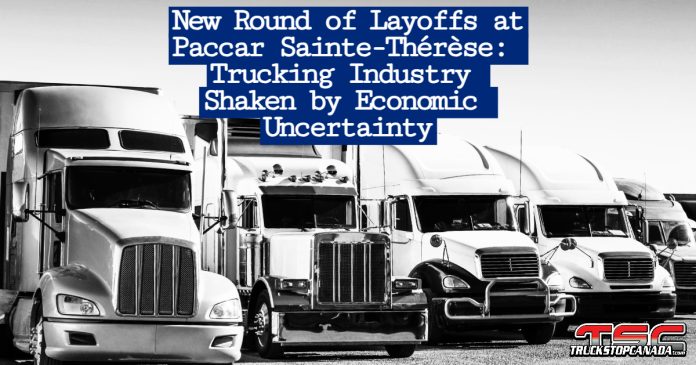Paccar’s Sainte-Thérèse plant, located just north of Montreal, is about to face another round of layoffs. The Unifor union has confirmed that 175 employees will be let go as of August 4, 2025 — less than a year after 250 workers were laid off in December.
The plant, which assembles medium-duty Kenworth and Peterbilt trucks, is Paccar’s only manufacturing facility in Canada.
This decision comes amid a sharp downturn in demand for commercial vehicles, both in Quebec and across North America. Several economic factors are converging: rising production costs, inflationary pressures, fragile supply chains, and, most notably, uncertainty stemming from new U.S. trade policies. The tariffs imposed under the Trump administration, while not directly responsible for the layoffs, have created hesitation among fleet operators, leading many to delay or cancel truck purchases.
According to statements made to La Presse, the plant’s management reports a nearly 50% drop in production volume over the past year. Paccar, which ended 2024 with over 30,000 employees globally, is now feeling the pressure of a saturated and hesitant market. Experts cited by The Wall Street Journal describe a “prolonged freight recession” driven by historically low shipping rates, truck overcapacity, and widespread reductions in freight demand.
Other major manufacturers are facing similar challenges. Volvo Group announced layoffs affecting 800 workers in the U.S., while Traton SE — parent company of International — eliminated a full shift at its Mexican plant, resulting in 900 job losses. At Mack Trucks, between 250 and 350 positions are being cut in the Pennsylvania region. According to Business Insider, North American carriers are being held back by what analysts call a “tariff fog,” which is stalling short-term investment decisions.
Unifor is urging the Quebec government to intervene and mitigate the impact on workers. Quebec Director Daniel Cloutier is calling for a stronger local procurement policy that would allow public agencies to prioritize vehicles assembled in Quebec. However, two municipalities that attempted to favor specific truck brands in public tenders were recently reprimanded by the Autorité des marchés publics (AMP), limiting flexibility on that front.
In its latest investor communication, Paccar made no mention of the Sainte-Thérèse layoffs. Instead, the company emphasized the issuance of a special dividend to shareholders. This comes despite a sharp decline in profits for the first quarter of 2025 — down from $1.2 billion to $505.1 million year-over-year. The drop is partly due to a $264.5 million one-time charge related to civil litigation in Europe, as well as a steep decline in truck orders across North America.
The market slowdown is also reflected in updated forecasts for Class 8 truck sales. Initial projections for 2025 ranged between 250,000 and 280,000 units, but revised estimates now place that range between 235,000 and 265,000. Several manufacturers have responded by scaling back investments, particularly in research and development, which has also slowed in the current environment.
Some analysts still foresee a modest rebound in the second half of the year, largely driven by the need to replace aging fleets in the U.S. However, for the workers at Sainte-Thérèse, the future remains uncertain. Without meaningful government support and changes to public procurement rules, the outlook for Quebec’s only truck manufacturing facility remains fragile.
Read More :
The Colorful World of Engines: An Overview of Truckers’ Preferences

















Unless the feds cut interest rates and we finally get a permeant answer on what the tariff numbers will be. I do not believe sales will get any better when discussing medium or heavy-duty truck sales in 2025. I feel what will happen is Paccar will move some manufacturing from Canada and Mexico back to the US to help keep the main plants going and help domestic sales.